2-Greece(1)希腊文化
- 格式:ppt
- 大小:1.67 MB
- 文档页数:30
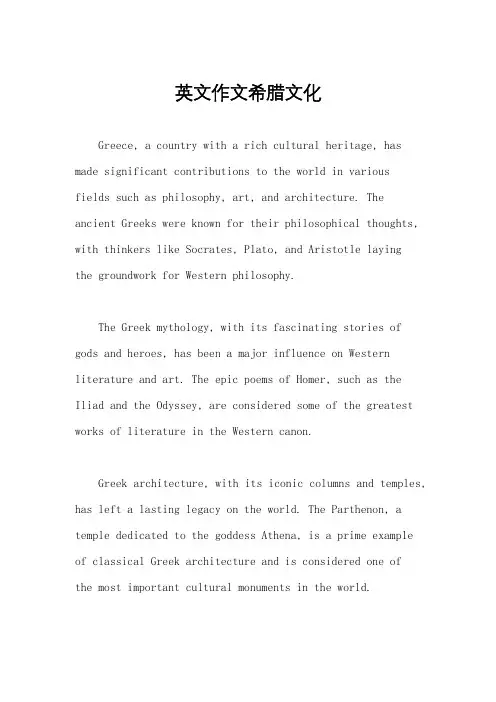
英文作文希腊文化Greece, a country with a rich cultural heritage, has made significant contributions to the world in variousfields such as philosophy, art, and architecture. The ancient Greeks were known for their philosophical thoughts, with thinkers like Socrates, Plato, and Aristotle layingthe groundwork for Western philosophy.The Greek mythology, with its fascinating stories of gods and heroes, has been a major influence on Western literature and art. The epic poems of Homer, such as the Iliad and the Odyssey, are considered some of the greatest works of literature in the Western canon.Greek architecture, with its iconic columns and temples, has left a lasting legacy on the world. The Parthenon, a temple dedicated to the goddess Athena, is a prime exampleof classical Greek architecture and is considered one ofthe most important cultural monuments in the world.In addition to philosophy, literature, and architecture, Greece has also made significant contributions to the field of sports. The ancient Olympic Games, held in Olympia, Greece, were a major event in the ancient world and have inspired the modern Olympic Games, which continue to be a symbol of international cooperation and sportsmanship.Greek cuisine is another aspect of Greek culture that has gained popularity around the world. From moussaka to souvlaki, Greek food is known for its use of fresh ingredients such as olive oil, herbs, and vegetables, and has become a favorite in many countries.The traditional Greek music, with its distinctive sounds of bouzouki and tzouras, reflects the country's rich musical heritage. Greek dances, such as the syrtaki and the zeibekiko, are an integral part of Greek culture and are often performed at festivals and celebrations.Overall, the cultural contributions of Greece have hada profound impact on the world, influencing various aspects of art, literature, philosophy, and more. Greece's richcultural heritage continues to be celebrated and appreciated by people around the world.。


古代希腊罗马文化
古希腊文化是一种文化、宗教、哲学、艺术、体育等多方面的文化形式,它以希腊语为母语的人类,以波西米亚的文明为基础,以比萨斯的音乐、体育活动以及拉丁语为基础的帝国文化,近代以古典文学为基础的文化,最终形成了丰富多彩的古希腊文化。
这种文化的价值在于它不光仅代表着一个民族的文化,它也以其中一种形式展示了其中一种文化。
古罗马文化是希腊文化的后续文化,它以罗马帝国为基础,以罗马法律为基础的罗马文化以及它的传统,以及罗马神学,帝国文学等有着许多的类似古希腊文化的特色。
它不仅体现了古希腊文化的一些基本特征,而且吸收了许多古希腊文化的优点,并将其完善和发展,使其成为希腊文化的重要补充。

希腊文化和罗马文化
希腊文化和罗马文化是西方文化的源头,二者不但以成果辉煌著称于世,而且以理性精神独树一帜。
在上古世界,希腊文化和罗马文化像一个高能量的“精神能源”,呈辐射状向地中海周围地区强劲扩散,自古及今,一直影响着欧洲和世界的文明。
在希腊时代,希腊文化主要流行于以希腊半岛为核心的南欧地区。
希腊衰落后,继起统治欧洲的罗马人几乎原封不动地将希腊文化继承下来。
罗马人军事强大,然而文化却远远落后于希腊人。
他们以希腊为师,在文化的各个方面都模仿希腊。
罗马的神祇由希腊移植而来,罗马的哲学受希腊观念的影响,即使是罗马的雕塑,也多是对希腊雕塑的复制。
事实上,罗马人在意识形态上完全地被“希腊化”了。
可以这样说,罗马在军事上征服了希腊,然而希腊却从文化上征服了罗马。
在罗马帝国强盛时期,其统治范围除了希腊所在的南欧,还包括意大利、西班牙、高卢、多瑙河和莱茵河流域,远达不列颠,实际上已经囊括了整个西欧。
罗马对西欧的统治是以武力实现的,在对西欧的征服中,希腊文化也就借助罗马人的武力从南欧逐渐传播到西欧广大地区。
希腊文化传播并植根于欧洲,罗马人功不可没。
对此,恩格斯曾评价说:“没有希腊文化和罗马帝国奠定的基础,也就没有现代的欧洲。
”
1/ 1。


导言一、西方文化史的含义1、什么是“西方”。
2、“文化史”的含义。
二、课程安排分五部分:希腊文化、罗马文化、中世纪基督教文化、文艺复兴文化和近现代欧美文化。
第一章古希腊文化近现代欧洲文化的起点和摇篮,有人说:希腊人创造力奴隶制条件下所能的最高成就的文化。
希腊史介绍历史分期:1、爱琴文明时代:公元前3000年到公元前12世纪。
2、荷马时代:公元前12-9世纪3、古风(古朴、殖民)时代:公元前8-6世纪。
4、古典时代:公元前5-4世纪。
5、希腊化时代4世纪末-2世纪中期。
近3000年的希腊文明史,共出现两次文化高峰:古典文化、希腊化文化。
第一节希腊文化产生和繁荣的原因一、民主制度和学术自由,这是希腊文化产生和繁荣的基础。
荷马时代以后,即公元前8世纪以后,希腊的社会生产力有了很大的进步,铁器使用日益普及,原始氏族制度已经瓦解。
希腊各地出现了一系列的奴隶制国家,它们均以一个城市为中心,包括若干乡镇组建起来的,这样的国家,我们称之为“城市国家”,简称“城邦”。
在所有希腊城邦中最具代表性的是斯巴达和雅典。
他们均为奴隶制共和国,这与东方各国极为不同。
东方君主制,西方为共和制。
原因为经济决定的,经济又为自然环境所决定的。
在共和制下,希腊城邦均实行公民集体统治,即有公民权者为统治者,无公民权者为被统治者。
在民主政治下,公民有权参与国家管理的权利,成为对国家对社会负责任的公民。
他们关心国家的命运,他们对国家队政治、经济都有绝对的发言权。
实际上是国家的真正主人。
正是这种民主政治和民主生活,才激发了希腊人渴求知识的强烈愿望和对真理的追求。
才产生了希腊人敏锐的智慧和观察力。
希腊的共和制又分为民主共和与贵族共和,以雅典为代表的是民主共和,以斯巴达为代表的是贵族共和。
希腊文化的繁荣主要是指以雅典为首的民主政治下文化的繁荣,因为和雅典相比,斯巴达的文化可以说是微不足道。
雅典位于希腊半岛东南部的阿提卡半岛,是以雅典城为中心建立起来的。
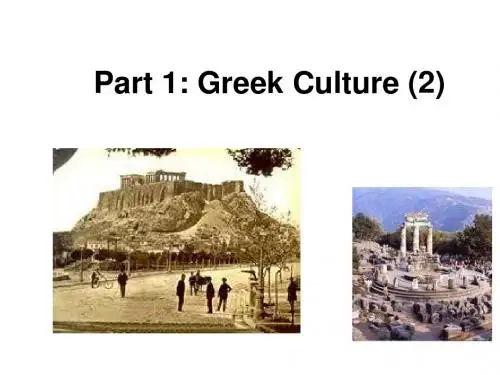
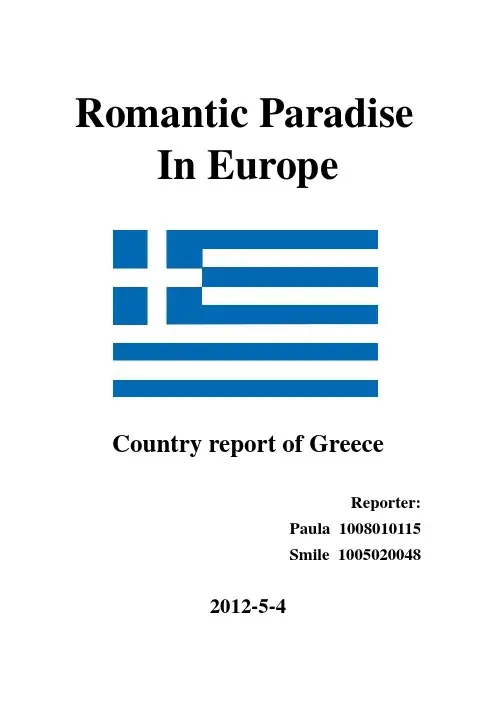
Romantic Paradise In EuropeCountry report of GreeceReporter:Paula 1008010115Smile 10050200482012-5-41.Basic Information(1)Name:The Hellenic Republic(2)Location:Greece is located in the southern end of the Balkans in southeastern Europe, northof the border with Bulgaria, Macedonia and Albania, the eastern border with Turkey and Aegean, and the southwest border with Ionian Sea and the Mediterranean.(3)Symbol:national flagnational emblemnational flower (Olea Europaea)national flag:The flag is composed by nine blue and white strips, and in the upper left hand corner there is a blue square within which a white cross is painted. The nine strips stand for the Greek motto: "Better to die than lose the freedom", which has nine syllables. The color blue on the flag is a symbol of the Christian faithnational emblem:The pattern of the Greek national emblem is a green olive branch surrounding the coat of arms with blue shield and white cross. Blue and white is the symbol colors of Greek, symbolizing this pure land between the sky and water, and the olive is a symbol of peace and wisdom. The simple and fluent lines on the Greek national emblem reflect the people's loyalty to Christ and the love for peace.(4)Natural Feature:The territory is mountainous and there are coastal plains; it is subtropicalMediterranean climate, little change of annual temperature, warm and humid in winter, hot and dry in summer. The average temperature in winter 6 ~ 13 ℃, 23 ~ 33 ℃in summer. (5)Territory:The territory of Greece is 131957 square kilometers, nearly the same size with thatof Anhui province.(6)Population:The population of Greece is 10,787,690, ranking 88th in the world.(7)Official Language:The official language of Greece is Greek, which belongs toIndo-European. Greek is one of the oldest languages in Europe and it once had a great influence on the whole European language.(8)Currency:The currency of Greece is EURO, and Drachma is the former one.(9)Capital:The capital of Greece is Athens, which has the same name of a goddess in Homer’sEpic who encouraged her people and fought with them.(10)N ation:About 98% of the people in Greece is Greek, the others are Turk, Macedonian andBulgarian.(11)S tate Religion:The state religion of Greece is Greek Orthodox. There are also Islam andorthodox Christianity(12)N ational Anthem:The national anthem of Greece is “Hymn to Liberty” , which is the longestnational anthem of the world.2.Brief historyThe Greek civilization was born in 800 BC. At that time, Greece established its own colony on the Mediterranean coast to and resisted the invasion of the Persian Empire.The ancient Greek was a collection of city-states. Greece used to be led by Macedonia andperished the Persian Empire under the leadership of Alexander III. Therewith, Greek culture was spread to Egypt, the Middle East and Central Asia, which known as the Hellenistic Age.Greece was conquered by the Republic of Rome in 168 BC. As a province of the Roman Empire, Greek culture continued to dominate the Eastern Mediterranean and affected people's life in Rome. In 395 AD, the Roman Empire was divided into the Eastern Roman Empire and the Western Roman Empire. Eastern Roman Empire with Constantinople as its center was deeply influenced by Greek culture; it had been resisting the aggression from the East and West for centuries. It didn’t belong to the Ottoman Empire until 1453 AD and the Ottoman Empire gradually conquered the whole of Greece.In 1821, the Greeks declared their independence. After the end of the Greek War of Independence in 1828, Greek monarchy was established in 1833. Throughout the 19th century and early 20th century, Greece continued to territorial expansion, until the Greek territory became what it is today in 1947.Greece announced to join NATO in 1949; the military staged a coup and deposed the king on April 21, 1967; the military regime collapsed in 1974. On June 11, 1975, Greece established the democratic republic. The Constitution provided for the state system as a "presidential parliamentary republic.In 1981, Greece formally joined the European Community (EC)3.Politics & EconomyPolitics:Greece is a parliamentary republic country. President is the head of the country, five years as a term with acceptable reappointment only once. The legislative power of country belongs to the parliament and the president and the executive power belongs to the president and the prime minister and the court handles the judicial power. The modification of the constitution in 1986 adds lots of restraint to the power of the president.The election system in Greece known as Proportional Representation is quite sophisticated. Small parties cannot have much influence. At the same time, the biggest party can control the parliament even though it doesn’t occupy the seats over a half. Every party needs at least 3% votes to hold a seat in the parliament.Economy:Greece joined the Euro-zone on January 1st, 2002.Tourism is the pillar industry, which occupies 15% of the GDP and foreign exchange income of Greece. As a main member that benefits financial aid from European Union (as much as 3% of its GDP), Greece experienced a stable growth in economy in the last few years.The main export commodities: food, beverages, petrochemical products and textiles.The main import commodities: machines, transport equipments, fuels and chemical products. Greece is one of the PIIGS (Portugal, Italy, Ireland, Greece and Spain). The problems need to be solved immediately including: reducing the unemployment rate, preventing the privatization of state-owned enterprises, improving the social insurance system, reforming tax system, and decreasing the deficiency of bureaucratic system.In February 2010, the Greek failure in repaying the debt of 300 billion euros might causebankruptcy, which brought a splash to all the European countries as the crisis of Greece might lead a bad influence on them. Resulting from the lack of diligence, luxurious lifestyle and the immoral way to join euro-zone, Greece caused the crisis of European sovereign debt, which almost disintegrated the euro-zone in 2011.4.Place to goTourism sight in Greece:There are a lot of famous buildings and beautiful tourist destination (scenic spots), many tourist attractions have beautiful or sorrow stories behind them, which make them become more attractive. Autumn is the most suitable (best) season to Greece and it can be really enjoyable to go there between September to October.Athens Acropolis :Athens Acropolis was built in the 5th century BC; it occupies an area of about 4,000 square meters and is 150 meters above sea level. It is the culmination of the ancient Greek architecture and sculpture and it is one of the world's new seven wonders. It is also a symbol of the ancient civilization of Greece and Europe. Acropolis, Greece's most distinguished ancient buildings, is a comprehensive public buildings and the religious and political center.The word “Acropolis” means “city-state on the high hi ll”. Its existing main buildings include the Gate, the Parthenon, the Erik Curtis Dion Temple and the Erechtheum Temple and so on. The Goddess Temple of Athena victory is the oldest building of the city.In ancient Greek mythology, people once set up a new town by the Aegean Sea. Athena and Poseidon both hoped to become the patron saint of this city and they refused to give in. Later, the god king Zeus ruled that the one who give the most useful thing to human beings can own the city. Poseidon gave human beings a strong horse, which is a symbol of the war, while Athena gave them a leafy olive tree symbolizing peace. People yearn for peace not war, and this city finally belongs to Athena. From then on, she became the patron saint of Athens. Later it was put Athens as "peace-loving city."Aegean Sea :Aegean Sea is a symbol of the romantic journey. The coastline of the Aegean Sea is very tortuous and it has a lot of harbors. They are about 2,500 islands, most of them belong to Greece and a small part of them belong to Turkey. The distance can be really short between the islands and you can see everything very clearly in the opposite island at the island you stay.There are many sayings about where the name “Aegean” comes from. Someone says it is a name of a queen who once lived in ancient Aegean and died in this sea at last; others says it comes from a king named Aegean, he thought his son dead and jumped into the sea, killed himself with a broken heart; there is also a saying that the word “Aegean” means wave.Mykonos :The island Mykonos is famous for its dreamy and romantic scenery. The alleyway, the doors and the windows in red, green or blue, the white churches and the white windmills beside the marinamake it the most popular resort island.Mykonos attracts tourists from all over the world. There are many restaurants, bars and stores along the coast and it is called “little Venice”. The beach is a good place for people to swim and sunbathe during the day, the bars and the cafes on the west coastline will become livelier when dusk is coming because tourists can get the best view for watching sunset there.The site of ancient Olympia:The site of ancient Olympia is in the western valley of Peloponnese, north to the Alfios (16 kilometers away from the outfall ), about 190 kilometers west to the capital Athens. It is located in the wooded hills of Cronus and is the Holy Land of ancient Greece.In the tenth century BC, Olympia was a religious center for the worship of Zeus. In addition to the temple, a variety of sports facilities for the Olympic Games is retained here too. From the year of 776 AD, the Olympic Games held every four years in Olympia, and from the 18th century, groups of scholars came here to study and find the ruins of the ancient Olympic athletics relic. In 1766, the British Chandler first discovered the ruins of the temple of Zeus. Since then, a large number of archaeologists and historians from Germany, France and Britain have had a large-scale exploration in Olympia ruins and acquired a large number of precious data of the ancient Olympic athletics relic in 1881. In 1936, after the 11th Olympic Games, the IOC decided to use the balance to continue the exploration of the Olympia ruins and recover the stadium.Olympia created the Olympic Games; it is a symbol of mutual understanding, friendship, solidarity and fair competition.Delphi:Delphi is only two hours’ drive from Athens. It is the mysterious land of Greece and the “centre of the ancient world”. The mysterious Delphi town was p laced on “The world heritage list” in 1987. According to the Greek mythology, in order to make sure the "world center", Zeus released two eagles to let them fly in opposite direction, and the place they meet should be the "world center". He then made his son Apollo to manage the center of the world and gave him a pebble, which made Delphi become the origin of the "oracle". Because of the oracle, Delphi had become a very famous resort where people made pilgrimages. But later Christian rise, oracle activities were banned and the temple was sealed up, Delphi gradually turned into ruins.5.Thing to donumber the windmills:There are five windmills in a small seaside hill in the southwest of Mykonos Island, which is a sign of Mykonos, You can do one very interesting thing on the island, that is to number the windmills. Sitting on the hill with the one you love and number the windmills with him/her in your leisure time, how romantic it is!Visit Athos:Athos is located in the peninsula of Mount Athos in the Greek coast. There are eleven towns and more than 15,000 residents on the island, including more than 900 monks. Dozens of monasteriesin different sizes and styles are built on the hillside.In 1060, Athos developed the law of "the ban on women onto the island". Prohibiting women and even female animals onto the island, the island is also referred to as "The country of men” by the Greeks, even the photographs and drawings of women or women’s daily necessaries are not allowed to be brought to the island.Athos is free from the Greek law and directly charged by the monastery. It is the only place that has hierarchism and abstinence life. 900 monks of intellectual breadth are sent to the island as soon as they are born. They have never seen women, radios, televisions, telephones, musical instruments or newspapers in their life and are not allowed to sing or smoke.6.CultureThe prosperity of Greece has once created its splendid ancient culture. On the basis of the extensive absorption of cultures in west Asia and Egypt, the ancient Greeks made a creative contribution to mathematics, astronomy, medicine, architecture, sculpture, drama, poetry, philosophy, history, elocution etc.Food & DrinkAs part of the Greek culture, the Greek food has a history of 4000 years and famous for its healthy diets. However, along with the increase of their incomes, the Greeks are gradually changing their traditional diet structure. Traditional Greeks eat much more fish, fruits and vegetables than meat. But modern Greeks like eating meat much more than before. More meat and fast food are making more and more obese people.A .OliveThe Greeks began to plant olives early on. They use them directly or as a minor ingredient of the main meal or cook food with their oil. The rate of heart disease in Greece is low.B .FetaFeta is a kind of white saline cheese; it looks a little bit like tofu, more like the Greek yogurt. People use ewe’s milk to make feta traditionally, but now milk is also used in many places. Feta is the most proud food of the Greeks, which can be eaten as an appetizer, snacks and staple food materials etc. The EU even sets the rule that only the Greek feta is the genuine one.C.Greek saladIt is made mainly of several fruits and vegetables. Black olives and feta are the supplementary raw materials.D .The Greek roast lambThe lamb chop is very fresh and tender and the flavor of goat is covered by the minor ingredient.E .Chicken spinach pieIt is a kind of light food without salt. You can feel very full after eating it.酥皮包里裹着鸡肉菠FishBecause Greece is pretty close to the Mediterranean, the Greeks like eating fish very much, like codfish, lobster, crab, unagi, snapper, mullets, shrimp and squid.DrinkIce water with lemon accompanies every meal in Greece. Many people enjoy strong coffee or strong tea, too. Adults may drink Greek wines or colorless ouzo.“Ouzo”Ouzo is also known as “anisette”. It is a kind of alcoholic beverage which you can only find in Greece. The alcoholicity of Ouzo is about 40% and it is made from grapes, pepper, fennel and other fruits and seeds with good smell. Add some ice water to Ouzo and it will turn into oyster white, like the spirit of ancient Greece. To the Greeks, drinking ouzo is an art and a way of life. The EU has also officially recognized ouzo as a Greek specialtyGreek wineGreece is not only one of the oldest wine production places, but also the oldest hometown of vineyards in Europe. There is a "Wine Festival" in Greece every year, when everyone will get together and enjoy the carnival time.DressingThe ancient dressing of Greece was made of rectangular fabrics without any clipping or seaming. People used pins and bands and bounded the fabrics on their bodies, creating a special style of “invisible form”. The main types are: doricchiton, ioricchiton, chlamys, pelops.PhilosophyThe Greek philosophy is the origin of western philosophy, the word "philosophy" came from the ancient Greek word “philo —sophia”, meaning love wisdom. For the Greek people, wisdom is not a perceptual knowledge, but the knowledge about the reason and principle of things.OlympicsThe Greeks made the tradition of holding sports meeting every four years in Olympia in 776 BC. During the games, the Greek players and the nearby people got together in the beautiful town——Olympia, which is located in southern Greece. Although military had been imprinted to the ancient Olympic sports, the games itself may be the big event that brought all the Greeks together.7.My opinion on this countryIn my opinion, Greece is a peaceful and romantic country. It is a place that has a long history and rich culture which makes it always seems peaceful and quaint. What’s more, it’s beautiful scenery and magnificent structures make it one of the most famous tourist attractions in the world.I love Greek blue and white houses and the blue sea most, and I’d love to go there with my family and enjoy the beautiful scenery on the beach one day. That will definitely be a wonderful experience in my life.。
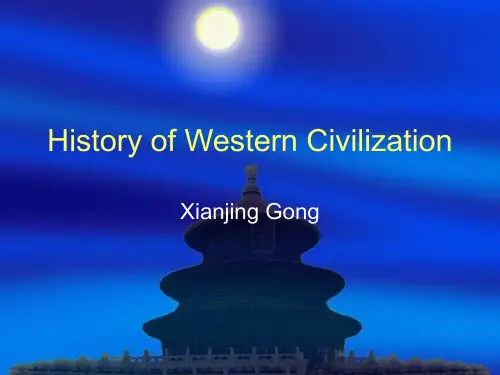
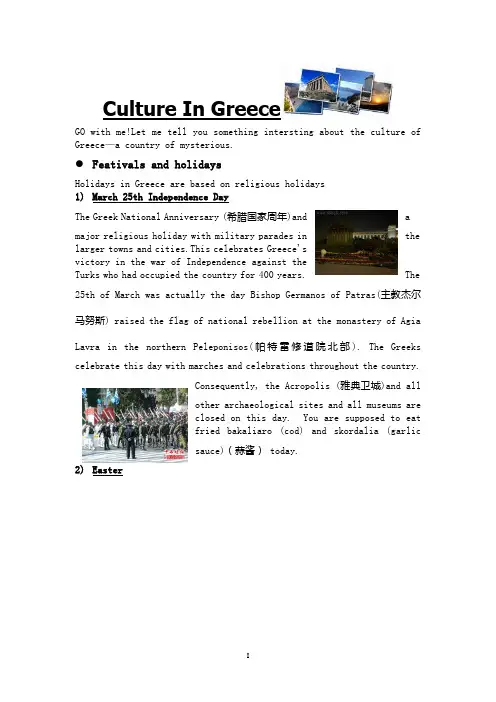
I Culture In Greece GO with me!Let me tell you something intersting about the culture of Greece—a country of mysterious. Feativals and holidays Holidays in Greece are based on religious holidays 1) March 25th Independence Day The Greek National Anniversary (希腊国家周年)and a major religious holiday with military parades in the larger towns and cities.This celebrates Greece's victory in the war of Independence against the Turks who had occupied the country for 400 years. The 25th of March was actually the day Bishop Germanos of Patras(主教杰尔马努斯) raised the flag of national rebellion at the monastery of Agia Lavra in the northern Peleponisos(帕特雷修道院北部). The Greeks celebrate this day with marches and celebrations throughout the country. Consequently, the Acropolis (雅典卫城)and all other archaeological sites and all museums are closed on this day. You are supposed to eat fried bakaliaro (cod) and skordalia (garlic sauce)(蒜酱) today. 2) Easter Celebrations begin in April or May. On Good Friday(耶稣受难日)the people of II

希腊古典文化介绍希腊文化的发展大致可分为三个阶段:神话与史诗时期、古典时期、希腊化时期。
古典时期则为希腊文化的全盛时期,不但产生了荷马史诗这样不朽的作品,而且涌现出大批诗歌。
这些诗歌包括抒情诗、讽刺诗、哲理诗等等。
有的歌咏神话故事和农民的生活;有的以写作战歌为主;有的以冷嘲热骂为特色;有的则抒写爱情。
到公元前5世纪,底比斯的诗人品达创作了许多颂诗,热情歌颂全希腊竞技会的胜利英雄,在古代希腊享有极高的声誉。
从公元前5世纪开始,戏剧在雅典获得了空前的繁荣。
古希腊戏剧起源于每年春秋两季对酒神的祭仪和民间歌舞,有悲剧和喜剧。
城邦政府直接组织和管理戏剧的创作与演出,剧场是半圆形的、砌有阶状座位的露天广场,可以容纳数以万计的观众。
雅典对于入场的公民还发放一种观剧津贴。
当时悲剧的杰出代表是三个雅典作家:爱斯奇里斯、索福克利斯和幼里披底斯。
爱斯奇里斯创作的时期是公元前5世纪初期,恩格斯称他为“ 悲剧之父”,他出身贵族,参加过波希战争,具有强烈的爱国精神,因此作品中充满信心和勇气。
《波斯人》一剧就热情洋溢地描写了雅典城邦对波斯帝国的胜利。
《奥瑞斯特亚三部曲》取材于希腊传说中奥瑞斯特为报父仇而杀死母亲和她的情夫的故事,反映当时社会和氏族制度的旧思想、旧传统的冲突。
他的《普罗米修士》一剧取材于普罗米修斯盗取天火的神话,普罗米修斯是位庄严而崇高的英雄,为人类的幸福和光明,他不畏强暴,不怕牺牲,不惜忍受苦难与暴力进行了不屈不挠的斗争。
幼里披底斯的创作时期是在公元前5世纪末,他出身于贵族,曾学过自然哲学,与苏格拉底有过交往,被誉为“舞台上的哲学家”。
他大约写了92部剧本,其中《美狄亚》、《特洛伊妇女》、《腓尼斯少女》等18部悲剧最为著名。
因此他的创作无论在内容和形式上都可看作是古典悲剧艺术的集大成者。
索福克利斯被誉为“戏剧艺术的荷马”。
他出身于雅典富商家庭,受过良好教育,对音乐与诗歌的造诣很深。
他28岁参加戏剧比赛,击败了爱斯奇里斯而获头奖,他是希腊悲剧作家中获奖最多的一位。
希腊文化英文作文英文:Greek culture is one of the most influential culturesin the world. From philosophy to art, the Greeks have made significant contributions to human civilization. One of the most well-known examples of Greek philosophy is the work of Aristotle, who was a student of Plato and a teacher of Alexander the Great. His ideas on logic, ethics, andpolitics have had a lasting impact on Western thought.In terms of art, the Greeks are best known for their sculptures. The most famous of these is the statue of David, which was created by the Greek sculptor Phidias. The Greeks also developed the concept of the theater and created plays that are still performed today. One of the most famous playwrights is Sophocles, who wrote tragedies such as Oedipus Rex.Greek culture also had a significant impact on language.Many English words have their roots in Greek, such as democracy, philosophy, and mathematics. The Greek alphabet also served as the basis for the Latin alphabet, which is used in many languages today.Overall, Greek culture has had a profound impact on human civilization and continues to influence us today.中文:希腊文化是世界上最有影响力的文化之一。
Good morning/afternoon/evening. It is my great honor to stand before you today to share with you the rich and fascinating culture of Greece. As the cradle of Western civilization, Greece has made invaluable contributions to the world in various aspects, including art, philosophy, politics, and science. In this speech, I will take you on a journey through the ancient and modern history of Greece, exploring its cultural heritage and its influence on the world today.I. IntroductionGreece, located in southeastern Europe, is a country with a long and proud history. It is often referred to as the "cradle of Western civilization" due to its significant role in shaping the foundations of modern society. The ancient Greeks have left an indelible mark on the world, and their cultural legacy continues to inspire and influence us today.II. Ancient Greek Culture1. PhilosophyThe ancient Greeks were the pioneers of Western philosophy. Philosophers such as Socrates, Plato, and Aristotle laid the groundwork for Western thought and intellectual development. Socrates emphasized the importance of questioning and critical thinking, Plato believed in the existence of a higher world of Forms, and Aristotle sought to understand the natural world through empirical observation and logic.2. Art and ArchitectureThe ancient Greeks were renowned for their art and architecture. The Parthenon in Athens, one of the most iconic structures in the world, isa prime example of their architectural prowess. The Greeks also developed a unique artistic style characterized by idealism, proportion, and harmony. Famous works of art include the sculptures of Phidias and the friezes of the Parthenon.3. LiteratureGreek literature has a long and esteemed tradition. Homer's epic poems, the Iliad and the Odyssey, are among the earliest works of Western literature and continue to be celebrated for their timeless themes and poetic beauty. Other notable Greek writers include Aeschylus, Sophocles, and Euripides, who are known for their tragedies.4. SportsThe ancient Greeks were passionate about sports, and the Olympic Games were born in Greece. The first Olympic Games took place in 776 BC in Olympia, and they were held every four years to honor the god Zeus. These games were not only a showcase of athletic prowess but also a way to foster peace and unity among the Greek city-states.III. Modern Greek Culture1. LanguageGreek is the official language of Greece and is spoken by approximately 13 million people worldwide. It is an Indo-European language and has a rich history of its own. Modern Greek has evolved from Ancient Greek, and it has borrowed words and influences from various languages over the centuries.2. CuisineGreek cuisine is famous for its simplicity, flavor, and health benefits. Olive oil, olives, lemon, and herbs are some of the key ingredients in Greek dishes. Famous Greek foods include moussaka, souvlaki, and baklava.3. Music and DanceGreek music and dance are an integral part of the country's cultural heritage. Traditional Greek music is characterized by its distinct rhythms and melodies, often accompanied by instruments such as the bouzouki and the bagpipes. Greek dance, such as the sirtaki and the zeibekiko, is a lively and energetic expression of cultural identity.4. Literature and TheaterModern Greek literature and theater have continued to thrive. Greek authors such as Nikos Kazantzakis and Elena Cousta have gained international acclaim for their works. Greek theater, particularly the work of playwrights like Costa-Eftihia Tsatsoulis and Iannis Ritsos, has also made a significant impact on the global stage.IV. ConclusionGreece's cultural heritage is a testament to the ingenuity andcreativity of its people. From the ancient philosophers and artists to the modern musicians and writers, Greece has contributed immensely to the world's cultural tapestry. As we celebrate the beauty and richness of Greek culture, let us also recognize the timeless lessons and values it continues to impart to us all.Thank you for your attention.。